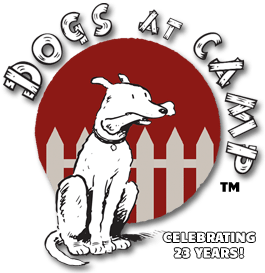Set Your Dog Up for Success
Give your dog a chance to get used to the camp environment and routine before leaving him or her for an overnight stay.
This is particularly important for dogs who are not used to regularly going to dog parks or daycare, or those who have not spent much time away from you.
If your dog is not used to being apart from you, and/or not used to going to dog parks or daycare, overnight camp can be a stressful experience. Before booking an overnight, try just a day of camp, and we can communicate with you during the day to let you know how things are going. If we feel your dog needs more time to adjust, we’ll recommend more ‘warm-up’ days, and/or one overnight.
Practice with your dog at home.
If your dog is not used to being apart from you, it’s going to take some practice to get to that point. Start by leaving him or her for a few minutes at a time. Then work up to an hour, then a few hours, and then an afternoon. Ensure that your dog has had plenty of exercise (a short leashed walk won’t do it) before leaving him or her alone, as a tired dog is much more likely to settle down when apart from you.
When working through these ’apart from you’ exercises, it’s normal for some dogs to bark (complain). As difficult as it may be to hear, we have to allow them to go through that phase and to get to a ‘settled’ (I’m okay alone for a while) phase. If your dog will not stop barking for an extended period time (15 – 30 minutes or more), he or she is not ready for camp.
Some other helpful ideas:
Take your dog to daycare/daycamp or other social off leash environments.
Ask a friend or family member to spend some time with your dog without you there. This will provide him/her with new experiences and environments, and will help build confidence.
Dogs pick up on their owners’ level of anxiety about leaving them alone. When you’re leaving your dog, a quick ‘goodbye’ with a positive, confident, and happy disposition, sets the right example. If your dog can feel that you’re upset or anxious about leaving, he/she feels that ‘something is wrong’.
If you see that your dog is anxious when you’re leaving, stay positive and confident (as noted above), rather than responding to that anxiety. Saying things like ‘it’s okay, don’t worry…’ in a concerned tone of voice is counter-productive. It adds to the anxiety rather than helping to build confidence.
Crate training can be very helpful for dogs. With practice, dogs can learn that the crate is their own space, and that it’s a safe and positive place. For some dogs, giving them something to chew or focus on in the crate can be helpful (e.g. a kong, chew treat, or dog puzzle).
Dogs need guidance, structure, and routine. When your dog knows what’s expected of him or her, you’ll find you have a happier and calmer dog, and that the bond with you will be healthy and strong.
If you’re finding that your dog is anxious when left alone and you haven’t been able to resolve this by following the steps above, it’s best to consult a dog trainer who can help you with this. Please discuss with us the work you’re doing with your dog and the progress you’re making before booking an overnight stay.
Confident dogs are happy dogs!
By learning that it’s okay to be alone and apart from you, your dog will gain confidence. Insecure or anxious dogs are not likely to enjoy camp time.
Help your dog build confidence and he or she will be all set to have lots of fun at camp!

